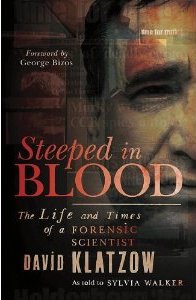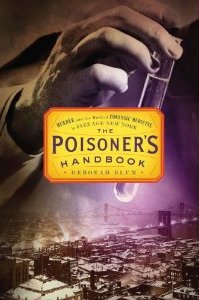March 2nd, 2011 by Bongi in Book Reviews, Opinion
No Comments »

 This post is a bit of a diversion from my usual posts, but I think it may still be worthwhile. You see, I want to promote a book.
This post is a bit of a diversion from my usual posts, but I think it may still be worthwhile. You see, I want to promote a book.
I’ve just read the book, “Steeped in Blood: The Life and Times of a Forensic Scientist” by David Klatzow. What a stunning book. It really gives insight into the South Africa of old and possibly what South Africa of future may end up being like. I suggest that everyone get ahold of it and read it.
However, David, I do feel I must challenge you on one point. Towards the end of your book, you say one of your surgeon friends told you a story of one of our Cuban import surgeons who tried to do a tonsillectomy through the neck rather than through the mouth, the normal way of doing it. I know this story and have heard it often myself in the corridors in Pretoria. Unfortunately it’s urban legend and nothing more.
I have worked with the Cubans, and they aren’t too shabby. Don’t get me wrong — they aren’t a scratch on a South African specialist (although the standards are dropping as you rightly point out, and quite soon they may be far better than homegrown specialists), but the point is that they wouldn’t do something so bizarrely stupid. I even suspect I know who your surgeon friend might be, especially if he presently finds himself in Pretoria rather than Johannesburg, where you no doubt got to know him.
Anyway, still an absolutely brilliant read for anyone who wants to get a peek into the workings of the apartheid government of old. Go and buy it now.
*This blog post was originally published at other things amanzi*
July 6th, 2010 by Medgadget in Better Health Network, News, Opinion, Research
No Comments »

Researchers at the University of Utah and IsoForensics, Inc. in Salt Lake City have demonstrated that water can potentially be used as a tracer to determine the travel habits of individuals.
Because of the natural geographic variability in the hydrogen and oxygen isotope content of water, proteins within hair should contain evidence of these ratios and therefore act as signatures as to where someone has traveled. The current study has shown that the geographic source of tap water, bottled water, beer, and soda can be distinguished simply by measuring the isotope ratio of the water within these drinks.
In our opinion if the technology pans out for real-world use, IsoForensics has a bright future with dictatorship governments, security and intelligence services, armed forces, and maybe even some legitimate forensic causes such as war-crime investigations or even anthropology studies.
Abstract in the Journal of Agricultural and Food Chemistry: Links between Purchase Location and Stable Isotope Ratios of Bottled Water, Soda, and Beer in the United States
Image credit: David Hannah
*This blog post was originally published at Medgadget*
May 20th, 2010 by David Kroll, Ph.D. in Better Health Network, Book Reviews, Opinion, Research
No Comments »

 This is going to be a quick welcome to Deborah Blum who has just moved her blog, Speakeasy Science, to ScienceBlogs.
This is going to be a quick welcome to Deborah Blum who has just moved her blog, Speakeasy Science, to ScienceBlogs.
Why quick?
Because I am only 22 pages away from finishing her latest book, The Poisoner’s Handbook: Murder and the Birth of Forensic Medicine in Jazz Age New York.
This engaging tale of the race of science and medicine against chemical poisonings for profit and punishment features the true story of NYC chief medical examiner Charles Norris and toxicologist Alexander Gettler.
Of course, the other actors are arsenic, methanol, chloroform, thallium, and radium, among others. In the teens through the mid-1930s, long before benchtop atomic absorption spectrophotometry and LC/MS instruments, Norris and Gettler devised methods to detect poisons in human tissues with high sensitivity. These advances led to the prosecution of some, the absolution of the wrongly-accused, and revealed that our own government poisoned citizens who dared to challenge Prohibition. Read more »
*This blog post was originally published at Terra Sigillata*
 This post is a bit of a diversion from my usual posts, but I think it may still be worthwhile. You see, I want to promote a book.
This post is a bit of a diversion from my usual posts, but I think it may still be worthwhile. You see, I want to promote a book.




 This is going to be a quick welcome to
This is going to be a quick welcome to 







